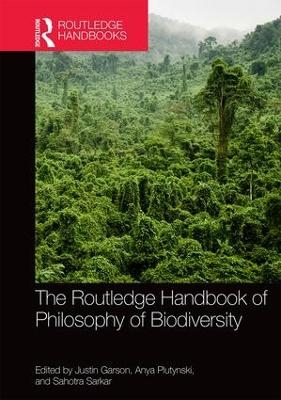
The Routledge Handbook of Philosophy of Biodiversity
Routledge (Verlag)
978-1-138-82773-8 (ISBN)
Biological diversity - or ‘biodiversity’ - is the degree of variation of life within an ecosystem. It is a relatively new topic of study but has grown enormously in recent years. Because of its interdisciplinary nature the very concept of biodiversity is the subject of debate amongst philosophers, biologists, geographers and environmentalists.
The Routledge Handbook of Philosophy of Biodiversity is an outstanding reference source to the key topics and debates in this exciting subject. Comprising twenty-three chapters by a team of international contributors the Handbook is divided into six parts:
Historical and sociological contexts, focusing on the emergence of the term and early attempts to measure biodiversity
What is biodiversity? How should biodiversity be defined? How can biodiversity include entities at the edge of its boundaries, including microbial diversity and genetically engineered organisms?
Why protect biodiversity? What can traditional environmental ethics contribute to biodiversity? Topics covered include anthropocentrism, intrinsic value, and ethical controversies surrounding the economics of biodiversity
Measurement and methodology: including decision-theory and conservation, the use of indicators for biodiversity, and the changing use of genetics in biodiversity conservation
Social contexts and global justice: including conservation and community conflicts and biodiversity and cultural values
Biodiversity and other environmental values: How does biodiversity relate to other values like ecological restoration or ecological sustainability?
Essential reading for students and researchers in philosophy, environmental science and environmental studies, and conservation management, it will also be extremely useful to those studying biodiversity in subjects such as biology and geography.
Justin Garson is an Associate Professor of philosophy at Hunter College of the City University of New York, USA. Anya Plutynski is Associate Professor in the Department of Philosophy at Washington University in St. Louis, USA. Sahotra Sarkar is Professor in the Departments of Integrative Biology and Philosophy at the University of Texas at Austin, USA.
Introduction Justin Garson, Anya Plutynski, and Sahotra Sarkar
Part 1: Historical and Sociological Contexts
1. A Confluence of Values: Historical Roots of Concern for Biological Diversity Timothy Farnham
2. Extinction and Biodiversity: A Historical Perspective David Sepkoski
Part 2: What is Biodiversity?
3. Approaches to Biodiversity Sahotra Sarkar
4. Is Biodiversity a Natural Quality? James Maclaurin
5. A General Model for Biodiversity and its Value Daniel P. Faith
6. Biodiversity Eliminativism Carlos Santana
7. ‘Biodiversity’ and Biological Diversities: Consequences of Pluralism between Biology and Policy David M. Frank
8. Ecological Hierarchy and Biodiversity Christopher Lean and Kim Sterelny
9. Unnatural Kinds: Biodiversity and Human Modified Entities Helena Siipi
10. Going Small: The Challenges of Microbial Biodiversity Christophe Malaterre
Part 3: Why Protect Biodiversity?
11. Is Biodiversity Intrinsically Valuable? (And What Might That Mean?) Katie McShane
12. What Good is it, Anyway? J. Baird Callicott
13. Economizing on Nature’s Bounty Lisa Heinzerling
14. Protecting Biodiversity and Moral Psychology; or Why Philosophers Are Asking the Wrong Questions Jay Odenbaugh
15. What Would Leopold Do?: Considering Assisted Colonization as a Conservation Strategy Ben A. Minteer
Part 4: Measurement and Methodology
16. Biodiversity Indicators Need to be Fit for Purpose Kerrie Wilson, Jacqueline England, and Shaun Cunningham
17. Using Concepts of Biodiversity Value in Structured Decision Making Lynn A. Maguire
18. Measuring Biodiversity and Monitoring Ecological and Evolutionary Processes with Genetic and Genomic Tools Alan R. Templeton
19. Estimating Biodiversity Loss Yrjö Haila
Part 5: Social Contexts and Global Justice
20. Putting Biodiversity Conservation into Practice: the Importance of Local Culture, Economy, Governance and Community Values Anya Plutynski and Yayoi Fujita-Lagerqvist
21. Synergies and Tradeoffs: Recognizing the Many Possible Outcomes of Community-based Conservation Jeremy Brooks
Part 6: Biodiversity and Other Environmental Values
22. Ecological Sustainability J. Baird Callicott
23. Ecological Restoration and Biodiversity Conservation Justin Garson.
Index
| Erscheinungsdatum | 25.05.2016 |
|---|---|
| Reihe/Serie | Routledge Handbooks in Philosophy |
| Zusatzinfo | 8 Tables, black and white |
| Verlagsort | London |
| Sprache | englisch |
| Maße | 174 x 246 mm |
| Gewicht | 778 g |
| Themenwelt | Geisteswissenschaften ► Philosophie ► Ethik |
| Naturwissenschaften ► Biologie ► Ökologie / Naturschutz | |
| Naturwissenschaften ► Geowissenschaften ► Geografie / Kartografie | |
| ISBN-10 | 1-138-82773-8 / 1138827738 |
| ISBN-13 | 978-1-138-82773-8 / 9781138827738 |
| Zustand | Neuware |
| Haben Sie eine Frage zum Produkt? |
aus dem Bereich


